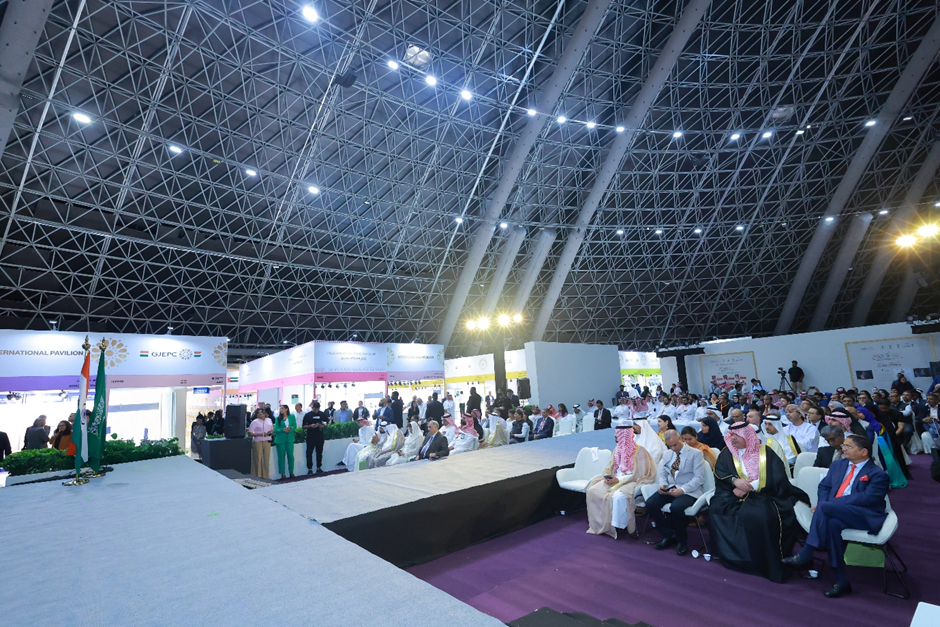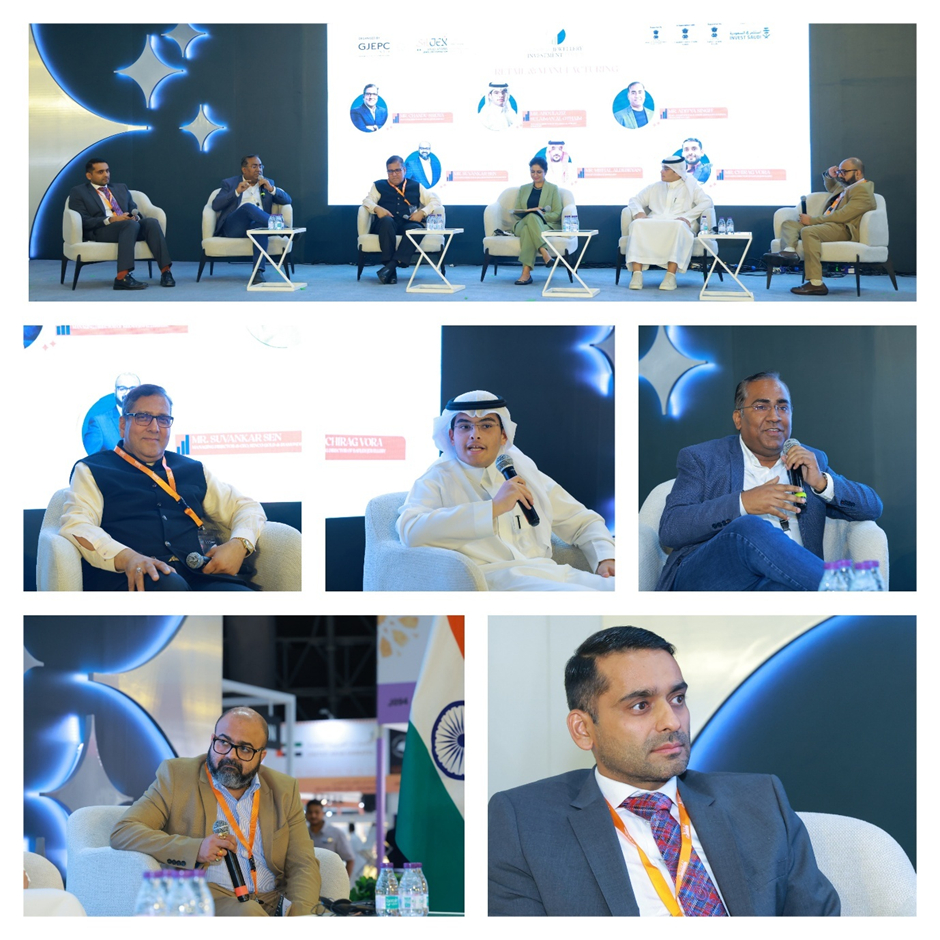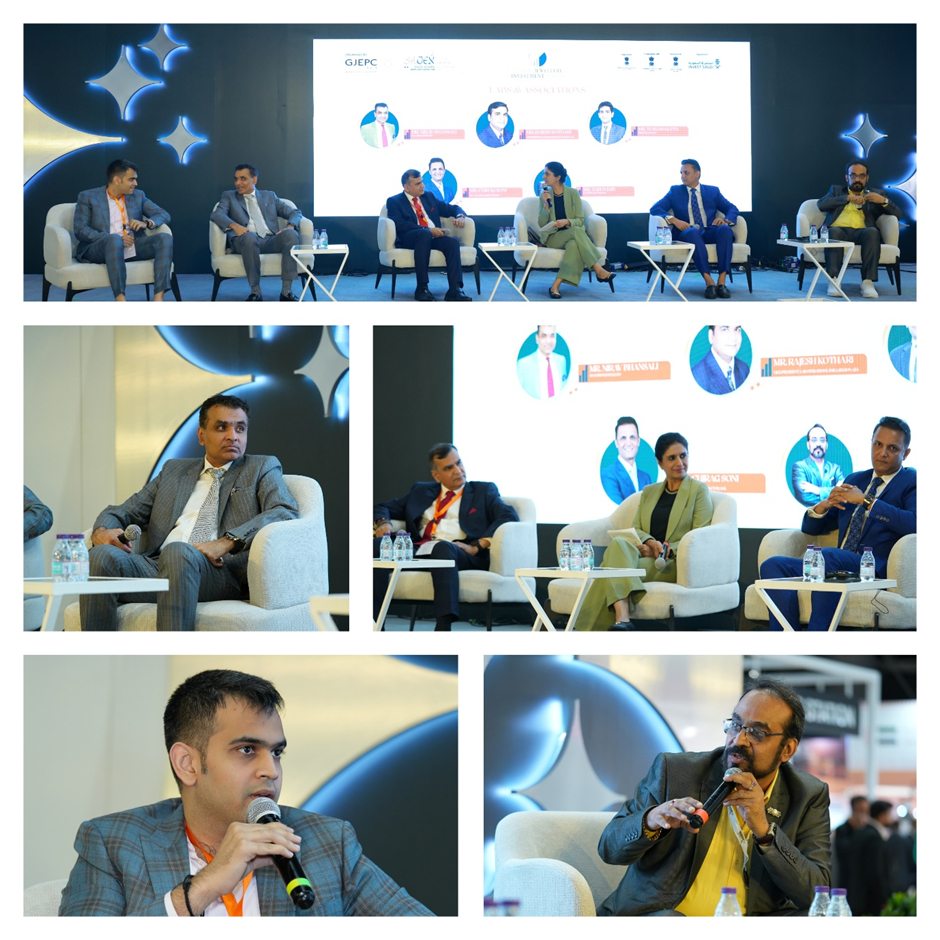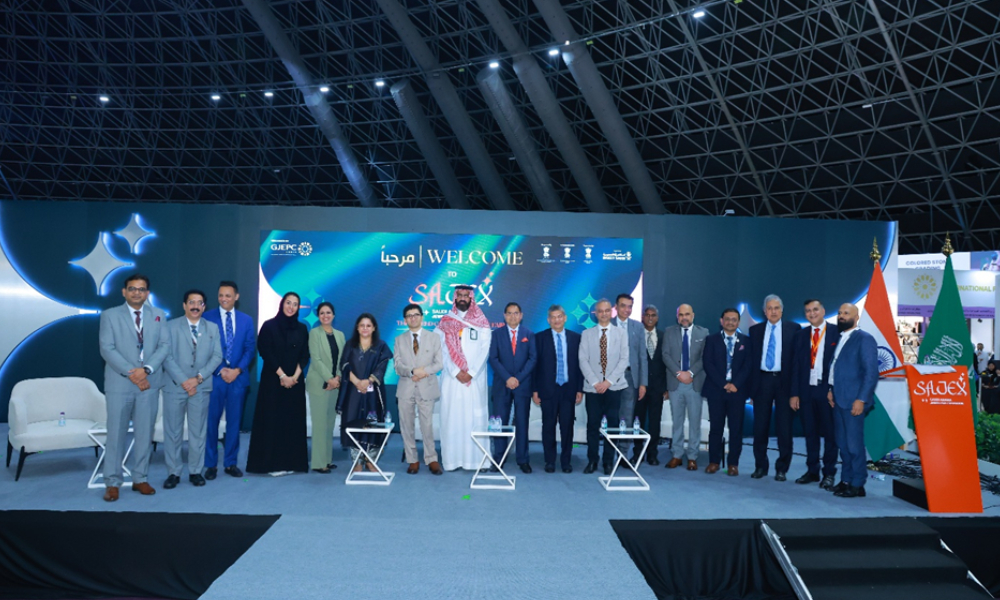The Global Jewellery Investment Forum, held on 11th September at the inaugural SAJEX 2025 in Jeddah, provided a platform for industry leaders, policymakers, and global stakeholders to chart the future of the jewellery sector in Saudi Arabia.
The context for the Global Jewellery Investment Forum was set by Mr. Sabyasachi Ray, Executive Director, GJEPC, alongside Ms. Haya AlAzman, Senior Relationship Management, FDI & Global Investment Strategy, Business Development at Invest Saudi, and Ms. Ghada Hayat, Senior Manager, Large Investor Relations, Ministry of Investment of Saudi Arabia.

Mr. Ray noted that India, the world’s second-largest jewellery market and leading exporter of gems and jewellery, boasts a US$32 billion export base and 5 million skilled artisans. Beyond its scale, India is investing in the future through initiatives like the India Jewellery Park in Mumbai, advanced gem labs, and modern manufacturing hubs, bringing unmatched expertise, craftsmanship, and global market reach to this partnership.
Ms. AlAzman and Ms. Hayat informed that the Saudi Arabia government is actively strengthening partnerships, attracting foreign capital, and developing a robust retail and manufacturing ecosystem through Invest Saudi and the Ministry of Investment. For India and global players, Saudi Arabia presents a fast-growing, high-value market opening like never before.

Moderated by Manisha Gupta, Editor, Commodities & Currencies, CNBC TV18, the Global Jewellery Investment Forum explored investment opportunities, retail and manufacturing opportunities, and the role of lab certification and standards in building trust. Together, the three panels offered a comprehensive roadmap for collaboration between Saudi Arabia, India, and the wider world.

Panel 1: Investment Prospects for Gems & Jewellery: Facilitating Seamless Trade by India & the Kingdom of Saudi Arabia with the World
The opening discussion brought together HRH Princess Nourah Al-Faisal, designer, entrepreneur, and founder of Nuun Jewels; H.E. Dr. Suhel Ajaz Khan, Ambassador of India to the Kingdom of Saudi Arabia; Shri Siddharth Mahajan, Joint Secretary at the Ministry of Commerce and Industry, Government of India; and Mr. Ahmed Alzubidy, Senior Advanced Geologist at the Ministry of Industry and Mineral Resources in Saudi Arabia.
Key Takeaways
- Saudi Arabia is reforming regulations in the precious metals and stones sector, streamlining mining licenses, and building transparency to create a globally recognised industry.
- The Kingdom holds vast reserves of gold, silver, platinum, copper, and gemstones, and seeks India’s expertise in cutting, polishing, training, and ecosystem development.
- India–Saudi trade ties are strong: India is Saudi’s 2nd largest trading partner, Saudi is India’s 4th; over 5,000 Indian companies are now registered in Saudi, doubling in two years.
- India offers 100% FDI in single-brand retail, jewellery parks in Mumbai and Jaipur, logistics hubs, digitalised approvals, and a large luxury-spending middle class.
- Both nations see Vision 2030 and India@2047 as complementary long-term frameworks for deeper collaboration.
- SAJEX is a prime example of diplomacy enabling business, fostering B2B partnerships, and building mutual trust.
- Saudi youth and designers are eager for education, infrastructure, and manufacturing support, and see India as the ideal partner to build this ecosystem.
- Challenges around regulation and licensing exist, but both governments are committed to resolving them through structured engagement.
Optimism is high: Saudi achievements under Vision 2030 are ahead of schedule, creating a fertile ground for joint growth in gems and jewellery.

Panel 2: Retail & Manufacturing: Co-creating the Future of Jewellery for the GCC Consumer
The second session featured Mr. Abdulaziz Al Othaim, Chief Executive Officer of Sulaiman Al Othaim; Mr. Chandraprakash Siroya, Managing Director of Siroya Jewellers; Mr. Aditya Singh, Head of Jewellery International Business at Titan Limited; and Mr. Chirag Vora, Managing Director of Bafleh.
Key Takeaways
- Vision 2030 and women’s empowerment are reshaping jewellery demand, led by a young, brand-conscious Saudi consumer.
- Cultural nuances remain critical: 21/22 carat gold dominates, with strong preferences for bold, large designs, even as diamonds gain traction.
- Saudi Arabia wants partnerships beyond simple B2B trade — in design, manufacturing, and retail — to reach a projected US$8–10 billion market by 2030.
- Indian brands must build trust from the ground up, respecting local tastes and ensuring transparency.
- The market spans all segments, from worker-focused collections to top-end luxury; offerings must be tailored accordingly.
- Joint manufacturing ventures are a major opportunity, with Saudi positioned as both a consumer and a potential production hub.
- Regulatory requirements around licensing and Saudization must be carefully navigated.
- Technology and omnichannel retail are vital, with young Saudis researching online but buying in-store.
The market is evolving rapidly; those who delay entry risk missing the opportunity.

Panel 3: Labs & Associations: Harmonizing the Market: How Labs and Associations Drive Consumer Awareness & Create Demand
The final session brought together Mr. Rajesh Kothari, Vice President – Lab Operations, EMEA Region, GIA; Mr. Tushar Gupta, Director of Suntech; Mr. Tarun Jain, Head of Gulf Gem Lab; Mr. Chirag Soni, Co-Founder and Director of SGL; and Mr. Nirav Bhansali, Chief Executive Officer of Prism Jewellery.
Key Takeaways
- Labs can play a pivotal role in bridging manufacturers, retailers, and consumers, with trust as the new currency in Saudi’s evolving jewellery ecosystem.
- Saudi Arabia is building its certification and standards framework, with demand not just for certification but also for education and awareness.
- Technology such as blockchain and cryptography-based solutions can address supply chain transparency, provenance, and consumer confidence.
- Consumer awareness and harmonised industry standards are essential to avoid confusion from varying grading systems across labs.
- Saudi offers a unique opportunity for labs to earn global credibility, given millions of tourists who buy jewellery there and take it abroad.
- Collaboration between private labs, government, and associations will be key to setting clear, enforceable standards and cutting clearance times.
Trust-building must be incremental, anchored in science, technology, and consistent global best practices.

